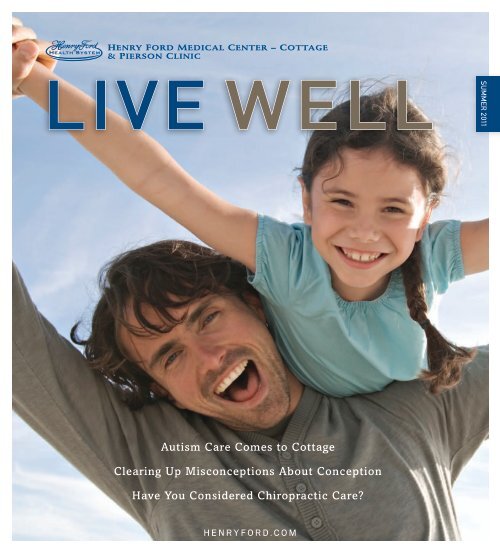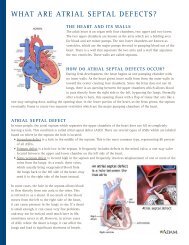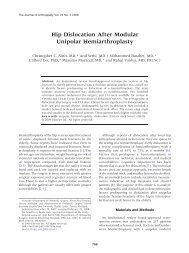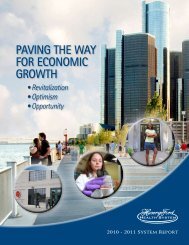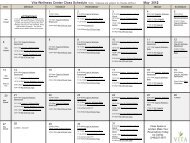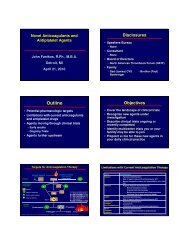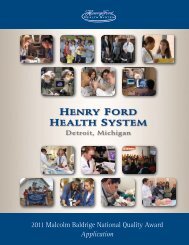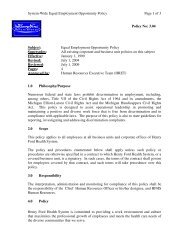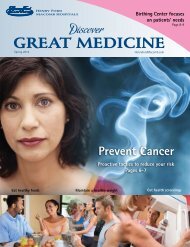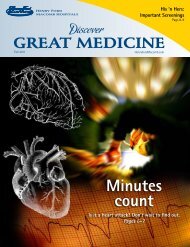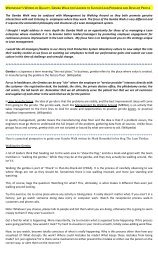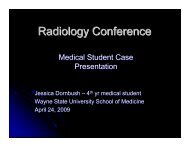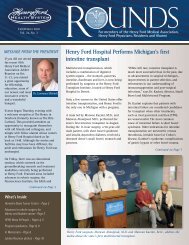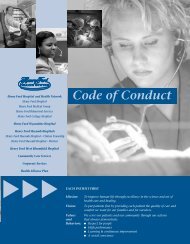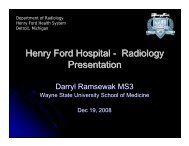Live Well Summer 2011 - Henry Ford Health System
Live Well Summer 2011 - Henry Ford Health System
Live Well Summer 2011 - Henry Ford Health System
You also want an ePaper? Increase the reach of your titles
YUMPU automatically turns print PDFs into web optimized ePapers that Google loves.
live well<strong>Summer</strong> <strong>2011</strong>Autism Care Comes to CottageClearing Up Misconceptions About ConceptionHave You Considered Chiropractic Care?h e n r y f o r d . c o m
Exercise Tips for Hot WeatherYou should exercise on most days of the week, nomatter what the weather. But exercising too long orhard in hot weather can cause health problems— especially for older adults and people with high bloodpressure or heart disease.Protect YourselfTo prevent heat problems, try these tips:• Exercise only at the coolest times of the day, before 10 a.m.or after 6 p.m.• Choose an air-conditioned or cool place to exercise.• Wear lightweight, light-colored, loose exercise clothes.• Do a light warm-up before starting your workout.Watch for Danger Signs• Drink about two cups of water before exercising. Duringexercise, drink every 15 or 20 minutes, even if you are notthirsty. Drink one cup of water every hour for two to threehours after exercising.• Avoid drinking coffee, tea, alcohol and sugary drinks.• If you have a medical condition, such as high blood pressure,ask your doctor about how to exercise safely in the heat.With the right precautions, you can move your exerciseroutine outdoors and enjoy the summer weather. Andif you find yourself needing emergency medical care,visit Cottage’s ER Express, where you will receiveexcellent care without the wait.Heat CrampsSigns: Heavy sweating andmuscle cramps in the stomach,arms or legs. What to do: Stop exercisingand drink some juice or a sports drink. Call yourdoctor if heat cramps do not go away in one hour.Heat ExhaustionSigns: Feeling tired, weak and dizzy; muscle cramps; heavysweating. What to do: Stop exercising, get out of the heatand sip water. Take a cool bath or sponge bath, or mistyourself in front of a fan. Call your doctor if symptoms getworse, include breathing problems or last longer than an hour.HeatStrokeSigns: Sweating stops, and the skin becomes hot anddry; body temperature increases rapidly. May causesevere headache, dizziness, nausea, vomiting,confusion or unconsciousness.What to do: Emergency! Call911 immediately.<strong>Henry</strong> <strong>Ford</strong> Medical Center – Cottage’sER Express is open 24 hours a day,seven days a week, and acceptspatients who arrive by ambulance.Cottage’s ER is staffed by boardcertified <strong>Henry</strong> <strong>Ford</strong> Medical Groupemergency medicine physicians andspecially trained clinical support staff.Learn more about Cottage’s ER Expressby visiting henryfordcottage.com orcalling (313) 640-2300.Autism CareComes to CottageWhen I began my pediatricophthalmology practice in 1980, it wasrare for me to see a child diagnosed withautism. Now, I examine several eachweek. So why the dramatic increase?There may not be more actualdisease, although current data does notrule out this possibility. But one surereason for the increase is a greaterwillingness by neurologists to make thediagnosis of autism in children who donot exhibit the full-blown disease.Autism Spectrum Disorders (ASDs)refers to a group of developmentalconditions characterized by significantdifficulty with social interactions as wellas restrictive and repetitive behaviors.Unlike some neurologic diseases thathave a clear unifying defect in a part ofthe brain or in some cellular process,the cause of ASD is still a mystery.But this much is known: Treatmentworks. There is no cure for autism, butthere is strong evidence that treatmenttailored to the child’s specific needs canreduce the effect of the communicationdeficit, reduce the associated familystress, improve a child’s ability tofunction independently and increasethe child’s quality of life.In this issue of <strong>Live</strong> <strong>Well</strong>, the articleon page 3 dispels some of the confusionabout autism and announces theopening of the <strong>Henry</strong> <strong>Ford</strong> MedicalCenter – Cottage Center for Autism andDevelopmental Disabilities.You will also read how we’ve expandedour Women’s Services at the Pierson Clinicwith the addition of two <strong>Henry</strong> <strong>Ford</strong>Medical Group obstetrician/gynecologists,Ronald Strickler, M.D., MBA, whospecializes in reproductive medicine andinfertility, and David Richardson, M.D.,who offers treatment for womenexperiencing bladder incontinence.I hope you find this issueinformative and helpful.Yours in good health,Edward R. O’Malley, M.D.Physician in Charge<strong>Henry</strong> <strong>Ford</strong> MedicalCenter – Cottage2 live well summer <strong>2011</strong>
p e d i a t r i c c a r eMyths and Facts About AutismThe numbers are undeniablyalarming. According to a study bythe Centers for Disease Controland Prevention, the prevalence ofAutism Spectrum Disorders (ASDs)increased 57 percent between 2002 and2006. Today, nearly 1 percent of childrenare diagnosed with an ASD. “Whileresearchers say no single factor canexplain the rise in cases, one thing iscertain: Parents can best help theirchildren by understanding the myths— and facts — about this disease,” saysColleen Allen, Ph.D., CCC/SLP,director for the Center for Autism andDevelopmental Disabilities (CADD)at the <strong>Henry</strong> <strong>Ford</strong> Medical Center –Cottage.Myth: All people with autism are alike.Fact: ASDs make up a group ofdevelopmental disabilities that affectsocial, communication and behavioralabilities. They are called “spectrumdisorders” because they affect eachperson in a different way, and symptomscan range from mild to severe.Myth: Autism is caused by vaccines.Fact: The idea that vaccines might play arole surfaced after a small 1998 studywas published in The Lancet and one ofthe authors made public comments. Inearly 2010, however, The Lancet studywas retracted by the journal after flawsin the authors’ research methods wererevealed. There is no scientific evidence,therefore, that vaccines cause autism.So what do experts think might causeASDs? “Research has exposed some riskfactors,” says Dr. Allen. “For example,children with a sibling or parent with anASD are at higher risk.” But the exactcauses are unknown and researcherscontinue to search for answers.Myth: Autism can be cured.Fact: Currently, there is no cure forASDs, but early diagnosis andintervention can greatly improve achild’s development. That’s why theAmerican Academy of Pediatricshas recommended that pediatriciansscreen all children for ASDs at 18 and24 months. <strong>Henry</strong> <strong>Ford</strong> <strong>Health</strong> <strong>System</strong>pediatricians have been trained toadminister early autism screenings atwell-child visits throughout earlychildhood.Myth: Children with autism need40 hours of intensive behavioral therapyper week.Fact: The amount and type of therapya child will need is dependent on thechild’s level of functioning and theircommunication and behavioral profile.Some children require more therapythan others. The ultimate goal ofintervention is to mainstream the childinto a regular education classroom.Myth: Special diets will lead to improvedbehaviors and communication skills.Fact: There is insufficient scientificevidence to show that diets are aneffective intervention for children withautism. However, anecdotal reports fromcaregivers have supported special dietsfor some children. There is no way topredict which children will benefit fromthese diets and which will not.<strong>Henry</strong> <strong>Ford</strong> MedicalCenter – CottageLaunches Centerfor Autism andDevelopmentalDisabilities<strong>Henry</strong> <strong>Ford</strong> Medical Center –Cottage medical professionalswill launch a Center for Autismand Developmental Disabilities(CADD) this fall to help familiessort out the facts and myths aboutthis complex disorder. CADDspecialists provide expertise in thediagnosis and treatment of AutismSpectrum Disorders.According to the CADD’sdirector, Colleen Allen, Ph.D.,CCC/SLP, the first step in any typeof intervention planning is acomprehensive evaluation conductedby a team of highly qualifiedprofessionals. “Our primary goal isto accurately identify the presence orabsence of autism, and secondly, tomake a specific diagnosis if autism isruled out,” says Allen.A comprehensive profile of thechild’s medical and genetic findings,behavior and communication skills isdeveloped from the evaluation, whichis then used to plan treatmentoptions and make referrals to othermedical specialists, if needed.The treatments offered at thecenter include speech and languageservices, social skills groups,behavioral interventions,occupational therapy and parent andfamily support groups. “We plan todevelop a ‘menu’ of treatmentoptions to meet the unique needs ofthese individuals and their families,in a clinical setting where ongoingassessment of progress and medicalproblems can be monitored byhighly qualified professionals,”adds Allen.We can help. Call the Centerfor Autism and DevelopmentalDisabilities, located at <strong>Henry</strong> <strong>Ford</strong>Medical Center – Cottage at(313) 916-4665.henryford.com 3
w o m e n ’ s h e a l t hHow to Know if Your BladderIs Working OvertimeDo you urinate eight or more times a day ortwo or more times a night? Does anirresistible urge to urinate ever make youwet yourself? These are possible signs of urgeincontinence or overactive bladder.An overactive bladder, like other types of urinaryincontinence, is a common problem affectingwomen. However, it isn’t normal—and, fortunately,it can be treated.Some women suffer from mixed incontinence, inwhich an overactive bladder aggravates a commoncondition called stress incontinence. Women withstress incontinence leak urine when they cough,sneeze or laugh.If your doctor determines that you have anoveractive bladder, he or she may ask you to keep adiary for a few days, noting the medicines you take,when you go to the bathroom and when you haveaccidents.Treatments and self-care tips proven effective foran overactive bladder include the following:• Perform Kegels. These simple exercises, which youcan do anywhere, strengthen the pelvic floormuscles that hold in the urine. You can do theseby tightening the muscles you would use to stop aflow of urine, then releasing.• Train your bladder. By following a programmedtimetable to urinate, you gradually increase the intervalsbetween trips to the toilet by 15 to 30 minutes eachweek, until you’re up to a normal time interval.• Limit or avoid foods that may prompt an urge tourinate. These include alcohol and foods andbeverages that contain caffeine, such as coffee, tea,cola and chocolate.• Cut down on fluid intake before bedtime.• Take a closer look at any prescription drugs you take.If necessary, work with your doctor to find substitutesfor possible offenders, including diuretics, sedatives,narcotics, antidepressants and antihistamines.If self-care steps can’t curb an overactive bladder,medicines or surgery may be necessary.David A. Richardson, M.D., isa <strong>Henry</strong> <strong>Ford</strong> Medical Group boardcertified obstetrician/gynecologistwho specializes in the treatmentof incontinence in women. To findout how Dr. Richardson can helpyou, schedule an appointment bycalling <strong>Henry</strong> <strong>Ford</strong> Medical Center– Cottage at (313) 640-2500.“Clambake at the Cottage”Friday, September 96:30 p.m. on the Cottage groundsJump into your casual clambake attireand enjoy a strolling dinner, liveauction, packaged raffle, entertainmentand complimentary valet parking.Proceeds from the third annualClambake at the Cottage will be usedto enhance and expand the outpatientRehabilitation Services Department at<strong>Henry</strong> <strong>Ford</strong> Medical Center – Cottage.For ticket information or to receiveyour invitation, contact StephanieShelters at (313) 874-6616 orsshelte1@hfhs.org.Grosse Pointe’sGreatest Block PartySaturday, September 1011 a.m. to 10 p.m.Sunday, September 11Noon to 5 p.m.On Kercheval Ave. andSt. Clair in the Village<strong>Henry</strong> <strong>Ford</strong> Medical Center – Cottageis again the title sponsor for this popularstreet fair, which offers activities for allage groups.4 live well summer <strong>2011</strong>
Clearing UpMisconceptionsAboutConceptionMany myths cloud the truth about conception.If you’re thinking about bringing a baby intoyour family, it’s important to get the facts.Pre-Pregnancy Advice from the ProsIt may seem like you should just know if you arepregnant. But most women don’t realize they’repregnant for a few weeks. So before you even starttrying to conceive, see your doctor to make sure yourdiet, health and lifestyle are in good shape.For example, your doctor may recommend getting400 micrograms of folic acid daily to help prevent birthdefects. Your doctor also may suggest lifestyle changes— such as quitting smoking or losing weight — to raiseyour chances of conception.One misperception is that it’s the woman’s fault ifshe has trouble getting pregnant. But infertility affectsjust as many men as women. Hopeful fathers shouldn’tsmoke or drink too much alcohol. These habits canaffect sperm and cause problems with fertility.The Best Time to TryDespite what you may have heard, there’s nothingmagical about day 14 of your menstrual cycle. That’ssimply the day a woman with an average 28-day cycleusually ovulates. Checking your temperature first thingin the morning — what’s called your basal bodytemperature — can help you pick your own best time tohave intercourse. That’s because your basal bodytemperature rises by 0.4 to 0.8 degrees Fahrenheitwithin three days of when you ovulate, or release an egg.To use this method to track your fertility, recordyour temperature at about the same time every morningfor several months. A common myth is that you’re morelikely to get pregnant on the day your temperature ishighest. Really, conception is likeliest:• Two to three days before your temperature rises to itshighest level• 12 to 24 hours after ovulationWhen You Have Trouble Getting PregnantYour best friend may have gotten pregnant the veryfirst month she tried. But only 20 percent of couples do,so hang in there! If you’ve been trying for a year andstill haven’t conceived, then seek help. If you are age 35or older, seek help after six months of trying.Does it seem as if in vitro fertilization (IVF) is themost common treatment for infertility? In fact, IVFaccounts for less than 5 percent of such treatments,according to the American Society for ReproductiveMedicine. There are actually many simpler, lessexpensive ways to enhance your chances of conceivingin the future.To schedule an appointment withRonald Strickler, M.D., MBA,specialist in reproductive medicineand infertility at <strong>Henry</strong> <strong>Ford</strong>Medical Center – Pierson Clinic,please call the <strong>Henry</strong> <strong>Ford</strong> <strong>Health</strong><strong>System</strong> Center for ReproductiveMedicine at (248) 637-4050.PreventSports InjuriesRunning, biking, playing tennis, taking dance classesand other sports are good for you, but these activitiesput you at risk for injury. The following tips can helpyou avoid the pain and downtime of athletic injuries:1Warm up and stretch every time you workout. You can walk, jog, cycle or performaerobic exercise for three to five minutes towarm up cold muscles.2Get in shape before you start a new sport orseason. Tune up your strength, agility,endurance and skills.3Learn proper form. If you’re starting a newsport, working with a coach or trainer canprevent bad habits and chronic injuriesdown the line.4Be consistent. Those who exercise for hourson the weekend but do nothing during theweek face an increased risk for injury.Instead, try to get some exercise every day.5Wear proper protective gear. This includesa helmet when you’re biking, skiing,snowboarding or in-line skating, andprotective eyewear for high-risk sportssuch as baseball and hockey.6Cross-train. Playing several sports or doingdifferent workouts helps prevent overuseinjuries, boredom and overtraining.7Cool down after your workout. After youfinish exercising, walk or continue youractivity at a slower pace to allow your heartrate to drop slowly.<strong>Henry</strong> <strong>Ford</strong> Medical Center – Cottage andPierson Clinic sports medicine physiciansChristopher Guyer, M.D., and TerrenceLock, M.D., offer extensive athletic and sportsmedicine services. To make an appointmentwith a Pierson Clinic sports medicine physician,call the <strong>Henry</strong> <strong>Ford</strong> Center for Athletic Medicineat (313) 972-4060.ChristopherGuyer, M.D.TerrenceLock, M.D..henryford.com 5
t h e r a p e u t i c c a r eAgrowing number of Americans have expanded theirdefinition of health care to include complementary andalternative medicine. Therapies range from deep breathingand chiropractic care to acupuncture and massage therapy.“Back pain is the most common condition that draws theroughly two out of five adults who use some form ofcomplementary or alternative medicine,” says <strong>Henry</strong> <strong>Ford</strong> MedicalCenter – Cottage chiropractor Lanny Orr, D.C., CCSP, a boardcertified chiropractic sports physician and <strong>Henry</strong> <strong>Ford</strong> MedicalGroup physician at Cottage’s new Center for Integrative Medicine.“People usually go to chiropractors when they’re experiencing painin the back, neck or head, which often is caused by misalignment ofthe spine or tightness in the muscles that attach to the spine.”The Spine: The Core of Our Support <strong>System</strong>Your spine is like a series of building blocks (vertebrae) stacked withrubber pads (disks) between each block. The spine serves as themain support of your body and the structure onto which musclesand nerves are attached. If one or more of these “blocks” is pulledout of alignment due to trauma, poor posture or overuse, musclesmay tighten or nerves may get pinched, causing stiffness and pain.“Let’s face it, most of us don’t give our spines a second thought,”explains Dr. Orr. “We hunch over computer keyboards at work allday, or do heavy lifting or repetitive movements on the job. Thenwe get home and slouch on couches and go to sleep on saggingmattresses. Extra body weight also puts strain on the lower back.”“Homework” Is Key in Chiropractic CareChiropractic care is one of the most popular forms ofcomplementary medicine, according to Dr. Orr. It involves6 live well summer <strong>2011</strong>Have YouConsideredChiropracticCare?adjustments or manipulations of the spine or other parts of thebody to correct alignment problems. It also may incorporate theapplication of heat and ice, electrical stimulation, and rest orrehabilitative exercise in addition to manipulations.A successful treatment plan includes work at home by thepatient. “Much of the long-term success of chiropractic caredepends on patient compliance,” explains Dr. Orr. “If my patientsdon’t do the stretching or strengthening exercises I give them todo at home, their muscles can tighten up and actually pull theirspines back out of alignment, causing continued stiffness or pain.”Young athletes are referred to Dr. Orr by pediatricians wantingto keep their patients off anti-inflammatory medications, and hisolder patients are often able to reduce or eliminate their need totake expensive pain medications that could interact with otherdrugs they may be taking. But Dr. Orr is quick to admit that notevery ache or pain can be relieved by chiropractic manipulation.“I cannot help a patient with a torn shoulder rotator cuff or acartilage tear in their knee,” he explains. “I do adjustments toextremities, but I know when to back off and refer to the experts.”Dr. Orr has a special interest in treating theaging population, as well as treating sportsinjuries in the young-to-aging athlete. Toschedule an appointment at Cottage’s Centerfor Integrative Medicine, call (248) 380-6201.The MedicalBenefits ofMassageStiff necks and aching backs aren’tthe only ailments aided by massage.A growing body of evidencesuggests that massage can improvea variety of conditions — as aprimary or complementary therapy.The Archives of Internal Medicinereported that massage significantlyimproved the pain of knee arthritis,possibly by boosting circulationto the sore knee, toning thesupporting muscles and improvingjoint flexibility.Massage also may help othertypes of discomfort, such as musclesoreness after a workout. Amongcancer patients, massage is one ofthe most popular complementarytherapies to reduce anxiety. Otherresearch shows that massage canslow the heart rate and promoterelaxation.Many different styles ofmassage are available, from gentlestrokes to deeper kneading motions.Some are geared toward stressrelief, while others are aimed at aparticular medical problem, such asmuscle spasms.Cottage Centerfor IntegrativeMedicine certifiedmassage therapistDiane M.Urquhart,NCTMB, NMT,has advanced training andexperience in structuralbodywork, neuromusculartherapy, craniosacral therapy,reflexology and therapeuticmassage. To schedule anappointment with Urquhart,call (248) 380-6201 or visithenryford.com/CIM.
Cottage Behavioral <strong>Health</strong> ProgramTeaches Valuable Coping SkillsWhen severe depression pushed Mary* ofSt. Clair Shores to the brink of suicide,her psychologist gave her two options:be admitted to an inpatient psychiatric facilityor enroll herself in the outpatient PartialHospitalization Program (PHP) at <strong>Henry</strong> <strong>Ford</strong>Medical Center – Cottage. Mary chose Cottageand credits the program for “saving her life.”Mary says that PHP Medical Director andpsychiatrist Dan Guyer, M.D., diagnosed her bipolardisorder (also called manic depression) after she hadexperienced debilitating emotional highs and lowsfor 40 years.“I was deeply depressed for so long that I wasseriously going to commit suicide,” says Mary, age 50.“My therapist had never seen me during a manicphase, so she was treating me only for depression. Igot so low that she recommended Cottage’s programas a last resort, and they were able to get me inwithin two days of my calling.”PHP Provides Thorough and ExpertOutpatient CareThe PHP at <strong>Henry</strong> <strong>Ford</strong> Medical Center – Cottageprovides daily, intensive, outpatient behavioralhealth therapy in a comfortable group setting.It combines close, personal treatment with theconvenience of going home on evenings andweekends. “Because we keep our patient groupssmall, our program provides an excellentopportunity to tailor treatment and really focus onthe individual needs of each patient,” explainsCottage’s PHP Coordinator Christine Hilton,LMSW, a behavioral social worker.Under the direction of Dr. Guyer, the PHP staffis comprised of behavioral health professionals whoare intensively trained in dialectical behavioraltherapy (DBT). The program is the only one of itskind in southeastern Michigan that is certifiedto offer DBT, which teaches patients fourcoping skills: mindfulness, emotionregulation, distress tolerance andinterpersonal effectiveness. Mental healthconditions treated in the program includebipolar disorder, depression and anxiety.Patients Are Equippedto Manage Their <strong>Health</strong>“After Dr. Guyer diagnosed me with bipolardisorder, everything I’d been going through inmy life suddenly became clear to me,” says Mary.“Now I am on the right medications, I sleep sixhours a night and I just started a new job.”Mary keeps a few three-by-five cards with herat all times, on which she has written the four DBTskills she learned in the program. “If I just went onmedications without applying the DBT skills Ilearned, I probably would have gone off my meds,”admitted Mary. “I can’t stress enough to anyonewho may be suffering the way I was thatsometimes you just need to take a littletime out of life to fix the problem.”The Partial Hospitalization Programis covered by many health insurancepolicies. For more informationabout PHP or to refer a patient,please call (313) 640-2637.*Name changed to protect privacy.Cottage Auxiliary Kitchen TourJoin us Saturday and Sunday, September 24-25, for the CottageAuxiliary Kitchen Tour. Tour recently remodeled kitchens in as manyas eight fabulous Grosse Pointe homes on Sunday. Or make it anevening event and enjoy a strolling dinner on Saturday, with differentcourses offered in each home.The Kitchen Tour is the Cottage Auxiliary’s annual fundraiser to benefit <strong>Henry</strong> <strong>Ford</strong>Medical Center – Cottage and Pierson Clinic patient programs and services.The event is in its fourth decade and remains as popular as ever.For ticket information for this exciting event, call (313) 882-5109.henryford.com 7
live wellNancy SchlichtingPresident and CEO, <strong>Henry</strong> <strong>Ford</strong> <strong>Health</strong> <strong>System</strong>Edward R. O’Malley, M.D.Physician-in-Charge, <strong>Henry</strong> <strong>Ford</strong> Medical Center – CottageNancy Zehnpfennig, R.N.Administrator, <strong>Henry</strong> <strong>Ford</strong> Medical Center – Cottage and Pierson Clinicrebecca A. ShulmanDirector, Marketing and Public Relations,<strong>Henry</strong> <strong>Ford</strong> Medical Center – Cottage<strong>Live</strong> <strong>Well</strong> is published by <strong>Henry</strong> <strong>Ford</strong> <strong>Health</strong> <strong>System</strong>. The informationis intended to inform and educate about subjects pertinent to healthand should not be a substitute for consultation with a personal doctor.Send comments or suggestions to rshuma1@hfhs.org.© <strong>2011</strong> Printed in the U.S.A.Printed on Recyclable Paper10344M<strong>Henry</strong> <strong>Ford</strong> <strong>Health</strong> <strong>System</strong>One <strong>Ford</strong> PlaceDetroit, MI 48202Nonprofit OrgU.S. PostagePAID<strong>Henry</strong> <strong>Ford</strong><strong>Health</strong> <strong>System</strong>Get Ready to Rollwith Tour de <strong>Ford</strong>On Sunday, September 18, <strong>Henry</strong> <strong>Ford</strong>Medical Group EmergencyDepartment will hold its secondannual Tour de <strong>Ford</strong> bicycle ride.The event will feature threeroute options — 10, 35, or70 miles — beginning andending at <strong>Henry</strong> <strong>Ford</strong>Hospital – Detroit, with stopsat <strong>Henry</strong> <strong>Ford</strong> Medical Centers inDearborn, West Bloomfield, andGrosse Pointe. Registation fee is$55, due at time of registration,and includes an event t-shirt,food and beverages before,during and after the event,and a ride-related swag bag.Proceeds will benefit theTom Groth Patient MedicalNeeds Fund.Sign up today! Call(313) 876-1031 or visitwww.henryford.com/tourdeford.Got a Smartphone?Download the <strong>Henry</strong> <strong>Ford</strong>ER Locator app by scanningthis QR code with yoursmartphone. To downloada free QR code scanner,visit your smartphone’sapplication store.ClinicalExpertise in YourNeighborhoodServices at <strong>Henry</strong> <strong>Ford</strong> MedicalCenter – Cottage159 Kercheval• 24-hour/7-day Express Emergency Department• Outpatient Behavioral <strong>Health</strong> Services• Cardiac and Pulmonary Rehabilitation• Cardiology Clinic• Center for Integrative Medicine• Center for Radiation Oncology• Infusion Services• Laboratory Services• Nuclear Testing• Outpatient Rehabilitation Services• Pain Center• Radiology Services• Sleep Center• Speech Pathology• Surgery Center• Vascular Services• Women’s Diagnostic CenterServices at <strong>Henry</strong> <strong>Ford</strong>Medical Center – Pierson Clinic131 Kercheval• Athletic Medicine• Colon/Rectal Surgery• Dermatology• Gastroenterology• Gynecology• Internal Medicine• Nephrology• Orthopaedics• Plastic Surgery• Pulmonary• Pharmacy Services• Rheumatology• Wound CareLearn more about how services at <strong>Henry</strong> <strong>Ford</strong> Medical Center – Cottage and Pierson Clinic can helpkeep you and your family healthy. Visit henryfordcottage.com or call (313) 640-2500.


